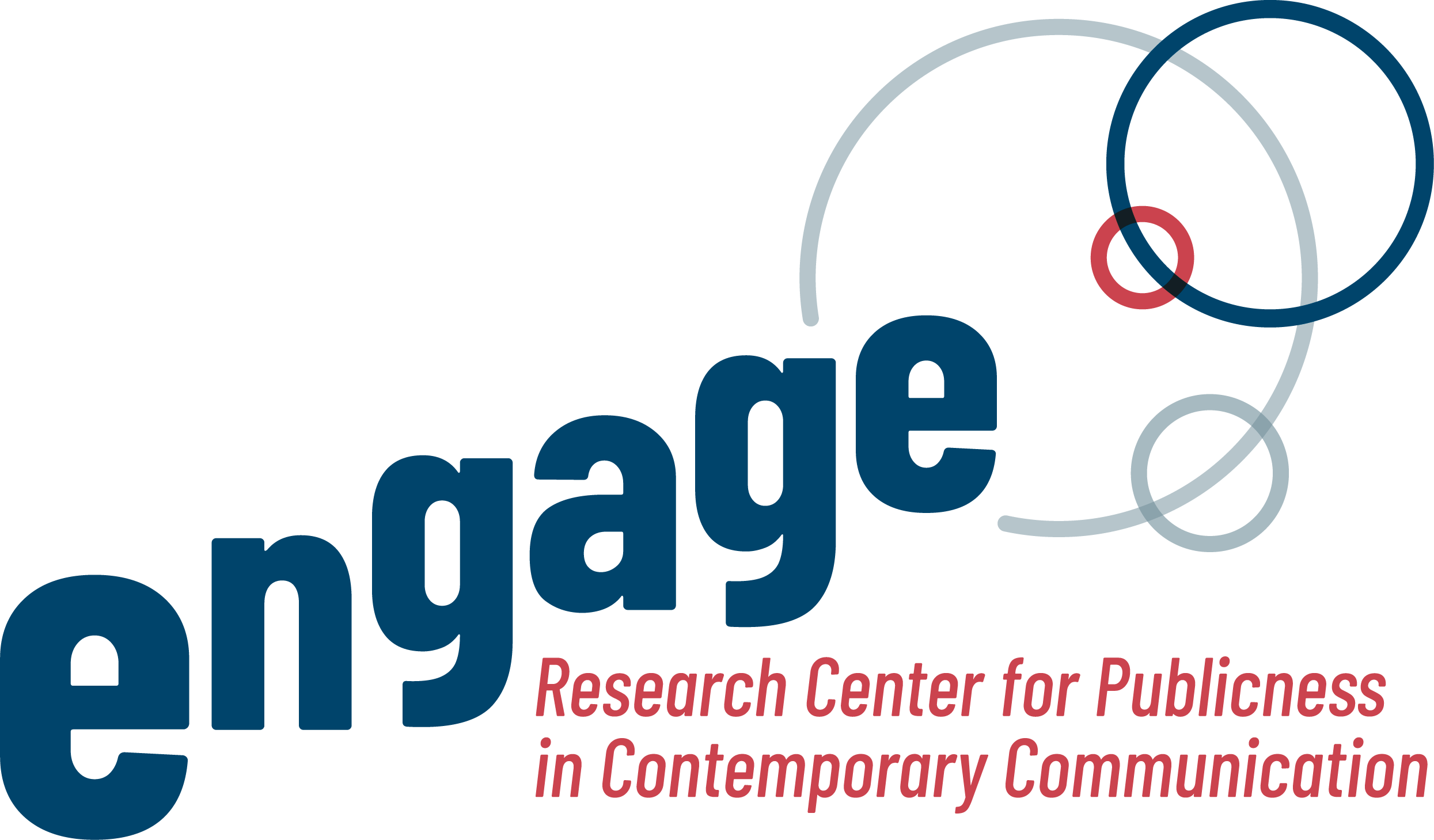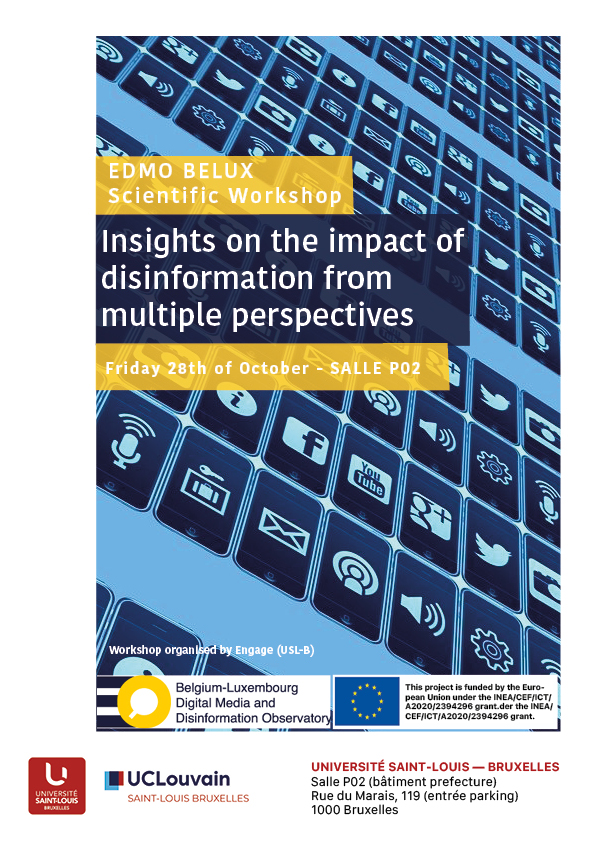EDMO BELUX, the Belgian and Luxembourgish hub for the monitoring of, and research on digital media and disinformation, is pleased to invite you to a scientific workshop where the researchers of the hub will present their first research results after one year of conducting the project. The EDMO BELUX presentations and discussions will be preceded by a keynote presentation by Divina Frau-Meigs (UNESCO chair Savoir-devenir and President of the Savoir-Devenir association).
Registrations are open until 20 October.
EDMO BELUX is a cross-community, multilingual collaboration between Vrije Universiteit Brussel (VUB), Université Saint-Louis – Bruxelles (USL-B), Mediawijs, Média Animation, EU DisinfoLab, Agence France-Presse, RTBF, RTL Luxembourg and Athens Technology Center.

PROGRAM
9:30 – 10:00 Welcome & Coffee
10:00 – 10:30 Introduction
EDMO BELUX and its research component.
Marie Dufrasne & Geoffroy Patriarche (USL-B)
10:30 – 12:00 Keynote presentation
The new frontiers of media and information literacy: algo-literacy through the Crossover project
Divina Frau-Meigs (UNESCO chair Savoir-devenir and President of the Savoir-Devenir association)
This presentation will focus on an on-going project, Crossover, to consider the various MIL competences required to be able to develop a responsible response to algorithms when dealing with online information and disinformation. The Crossover Kit will be presented via its different tools: the podcast with specialists, the supporting journalistic articles, the interactive quiz as well as a workshop/lesson plan for MIL practitioners (teachers, librarians, youth workers…). The discussion will consider the strategies to promote algo-literacy as a new frontier for MIL and the implications for research, evaluation and implementation.
12:00 – 13:00 LUNCH
13:00 – 15:00 EDMO BELUX presentations and discussions – Session 1
Disinformation and Digital Methods
Tom Willaert (VUB)
The study of online conspiracy theory communities presents unique methodological challenges. Online conspiracy theorists often adhere to an individualistic knowledge culture of “doing one’s own research” (Fenster 158). This results in a decentralised landscape of theories, narratives and communities that challenges conventional top-down approaches to analysis. Moreover, conspiracy theories tend to be discussed on the fringes of the online ecosystem, in chat groups, small subcultural Web forums and away from mainstream social media platforms such as Facebook and Twitter (Frenkel; see also De Zeeuw et al.). In this context, the messaging app Telegram has developed into a particularly prominent space (Rogers, “Deplatforming”; Urman and Katz). Because Telegram communities are distributed over a wide range of channels and chat groups, they cannot always be investigated using existing analytical approaches for social media research. Confronting this challenge, this talk proposes and discuss a method for studying Telegram communities that repurposes the “methods of the medium” (Rogers, Digital Methods). Specifically, the method that will be presented appropriates Telegram’s feature of forwarding messages from one group to another to discover interlinked distributed communities, collect data from these communities for close reading, and map their information sharing practices.
Who is susceptible to (political) disinformation? Evidence from Flanders, Belgium
Jonas Lefevre (VUB) & Trisha Meyer (VUB)
Which citizens are most susceptible to disinformation that is spread online? We investigate patterns of susceptibility to disinformation, defined here as a combination of exposure to, and belief in, disinformation. We use survey evidence gathered amongst citizens living in the region of Flanders, which is the largest region of Belgium. First, we consider to what extent citizens’ socio-demographic characteristics and socio-political attitudes help us understand which citizens are more (or less) likely to get exposed to, and believe, false claims. In other words: which citizens encounter disinformation, and/or accept it as truth? Second, we zoom in on the effect of exposure to disinformation online: to what extent does exposure to disinformation online lead citizens to increasingly believe these false claims? Our findings indicate that especially citizens who get their information through online channels such as news aggregators tend to have both higher exposure to, and belief in, disinformation. Relatedly, younger citizens tend to attribute greater credibility to disinformation, as do citizens that self-position on the right of the political spectrum. We also find strong evidence that those citizens who believe general conspiracy theories, have a high propensity to also accept specific disinformation campaigns. Moreover, our experimental evidence finds that exposure to social media messages containing disinformation increases citizens’ belief in the disinformation, which is worrisome. We also demonstrate that warning messages implemented by social media platforms only partially mitigate the impact of disinformation campaigns.
Folk theories of info-democratic disorders in Belgium and Luxembourg: preliminary results from an ongoing qualitative audience study
Victor Wiard, Geoffroy Patriarche, Marie Dufrasne & Olivier Rasquinet (USL-B)
This presentation provides the preliminary results of an ongoing research project that aims to study the folk theories of info-democratic disorders in Belgium and Luxembourg, relying on a qualitative methodology based on semi-structured interviews with 30 informants in Belgium and Luxembourg. The first part of the presentation outlines the theoretical framework and the methodological design that allowed us to analyse, from a qualitative “audience studies” perspective, how people diversely theorise the nexus between information disorders and democratic disorders, i.e. “info-democratic disorders”. The second part of the presentation focuses on the 10 folk theories we identified so far, based on the 10 interviews already conducted. We labelled these folk theories as follows: (1) Legacy media do the job, errors are human; (2) Democracy deserves better than poor journalism: (2.1) “Fast clicks”, (2.2) Sensationalism, and (2.3) There’s no contradiction; (3) Politics is not sexy; (4) “Fake profiles” disturb the public debate; (5) Follow the money: (5.1) News serves the business of big media companies, and (5.2) News is part of a conspiracy led by “higher economic interests” and involving politicians; (6) What’s true or not is only a matter of one’s viewpoint; and (7) Everything is suspect on social media.
15:00 – 15:30 BREAK
15:30 – 16:10 EDMO BELUX presentations and discussions – Session 2
Platform responses to disinformation in Belgium and Luxembourg
Samuel Cipers (VUB) & Trisha Meyer (VUB)
This presentation recaps how platforms have taken action to counter online disinformation in Belgium and the Grand Duchy of Luxembourg. We reviewed the reports published by signatory social media platforms to the EU Code of Practice on Disinformation, including Meta (Facebook & Instagram), Google (including YouTube), Twitter and TikTok from August 2020 until April 2022 and identified initiatives of the platforms that were aimed at these countries. We find that platforms focus their efforts on prioritizing and amplifying content, initiatives that can be characterized as being low-cost efforts to inform the public. Most platforms’ country-specific response(s) were also only taken during the height of the corona pandemic in 2020, with Twitter marking the positive exception. We conclude that platforms make few efforts for country-specific responses when these countries constitute small markets.
16:10 – 17:10 EDMO BELUX participatory workshop session
How does the financial viability of the media market impact the spread of disinformation
Marlen Komorowski & Ike Picone (VUB)
In this interactive session, we invite you to give feedback on the financial news viability matrix that we are developing within the EDMO BELUX project. This matrix looks at supply side and demand side indicators to assess whether news media in a given market have the necessary financial resources to be able to perform their public tasks. We will present the key indicators in the matrix, and collect your thoughts, additions and comments to integrate in the second version of the matrix.
17:00 – 18:00 Conclusion – Networking – Drink
Infos & Registrations
The event is free but registration is mandatory via this link
When ? 28/10/2022, 9:30 – 18:00
Where ? Room P02
Université Saint-Louis – Bruxelles
119 Rue du marais (Parking Entrance, Prefecture Building)
1000 – Bruxelles
Registrations : Click on the link

